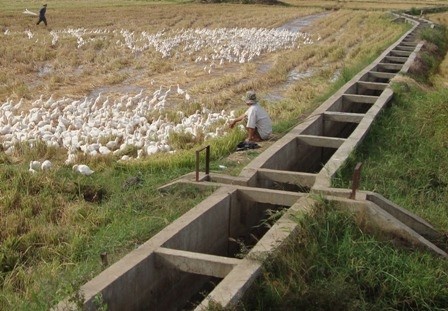(VOVworld) – The Mekong River Delta’s livestock production did not seem to suffer much damage from the recent drought, unlike the cultivation and fishery sectors. To overcome the consequences of the drought and reduce the adverse impacts of climate change, many provinces in the Mekong River Delta have shifted to livestock production to earn a living.
 |
| Embankment of canals is one of factors to make the crop restructuring in the Mekong delta region a success. (Photo: K.V) |
Agriculture is a spearhead economic sector of the Mekong delta region, but for a long time local provinces have only paid attention to developing cultivation and fishery. Livestock production hasn’t received its due concern and is carried out by households on a scattered scale, resulting in low economic effectiveness.
Nguyen Van Tranh, Deputy Director of Ca Mau Province’s Agriculture and Rural Development Department, said: “Ca Mau has identified a number of species for livestock production. Raising bees for honey is an advantage for the province. We can also raise swallows, which aren’t affected by either drought or salt water intrusion. We’ll also focus on raising sea ducks.”
In the current situation, Mekong delta farmers have raised their awareness of restructured domestic animals from traditional species, including poultry, cows, and pigs, to the ones which don’t depend as much on water resources, like sea ducks, goats, rabbits, swallows, bees, and snakes, and take full advantage of natural food sources.
In past years, sea ducks have been bred as part of pilot schemes in Tien Giang, Bac Lieu, and Kien Giang province, which have proven to be able to adapt to drought and salty water intrusion hit areas.
Nguyen Van Trong, the Deputy Director of the Department of Livestock Production of the Ministry of Agriculture and Rural Development, said: “The Mekong delta region has advantages for livestock production regarding diverse species. We now need to focus on technical solutions and agricultural extension measures. The most important solution is to choose the right species for salt water intrusion areas.”
Recently, the Institute of Animal Sciences for Southern Vietnam proposed that the government encourage people, cooperatives, and enterprises to invest in new technology to improve productivity and called for more studies on purebred breeds on a large scale.
Deputy Minister of Agriculture and Rural Development Vu Van Tam insisted that the ministry would ask the government to increase the budget allocation for the industry and put forward more technical solutions to develop livestock production in the Mekong River Delta.
He added: “The Ministry of Agriculture and Rural Development has realized that the Mekong delta needs to tap its advantages in animal husbandry to compensate the losses caused by salt water intrusion and drought. Livestock production should become a promising sector that helps us turn difficulties into advantages.”
Developing animal husbandry should be considered an advantage for the Mekong delta region. Local farmers should attach importance to the industry as much as to the cultivation and aquaculture. Closed production models should be built to link value chains from production to food processing, breeding, and product selling.